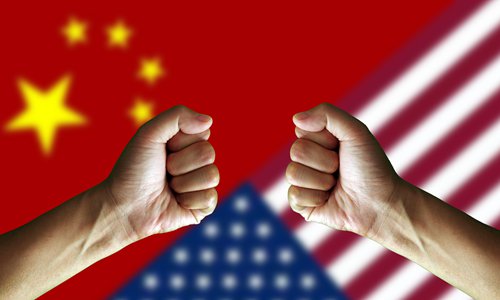HOME >> OPINION
US fantasizes over Taiwan Straits dominance
Source:Global Times Published: 2019/10/30 21:18:40

Photo: IC
The US Senate passed the "Taipei Act" on Tuesday. The House version of the bill will soon be reviewed by its Foreign Affairs Committee and will be submitted to the House for approval.
The legislation is called the "Taiwan Allies International Protection and Enhancement Initiative Act of 2019."
The act, which has attracted wide attention, supports Taiwan "in strengthening its official diplomatic relations as well as unofficial partnerships with countries" around the world. It also supports Taiwan's membership, or Taiwan being granted observer status, in all international organizations.
The bill requires the US government to punish countries that have reduced ties with Taiwan in terms of diplomatic and economic engagement, and reward countries that do the opposite.
This is a completely unreasonable bill, which expresses the self-righteous feelings and aspirations of many members of the US Congress. It is questionable how much effect it can have on China.
China will certainly not take this act seriously. It will launch new measures to combat "Taiwan independence" in accordance with its own principles and pace. The situation in the Taiwan Straits has not been dominated by the US attitude any more.
In the past two years, the US Congress has passed Taiwan-related bills, but the effect of "protecting Taiwan" is very limited, which reflects the actual decline of the US ability to influence the Taiwan Straits. Changes in the situation in the Taiwan Straits no longer depend on US will.
The "Taipei Act" may increase the concerns of some small countries to cut their "diplomatic ties" with Taiwan and establish formal relations with Beijing.
However, although Washington's threat to those countries has long been issued, the Republic of Kiribati and the Solomon Islands still chose to establish or re-establish diplomatic relations with Beijing. This shows that the US would face many unexpected difficulties when imposing its will in a way that violates justice and harms the interests of other countries.
The Chinese mainland's oath to take the Taiwan question as its core interest and its absolute confidence in resolving the Taiwan question through military means have shaped a solid framework over the development of cross-Straits ties. Beijing's policy of peacefully resolving the Taiwan question and its patience are based on the framework.
If Taiwan authorities go too far on "Taiwan independence," or are carried away by overly close relations with the US and violate the Anti-Secession Law, the Chinese mainland could change its Taiwan policy overnight, which would be an unbearable blow to Taiwan itself.
Compared with the above-mentioned options that the Chinese mainland has, the bills passed by the US Congress may eventually evaporate. Taiwan authorities should be reminded not to place high hopes on the members of the US Congress who are keen on electoral politics or the US "protection of Taiwan."
Taiwan's security and prosperity depend on how it coordinates its relationship with the mainland. A wise cross-Straits policy is more beneficial than Taiwan's purchase of F-16 fighters.
No country in the world is willing to become a real enemy of China, including the US, which just declared that China is its strategic competitor. If Taiwan authorities insist on being hostile toward Beijing, it will lead to a catastrophe to themselves sooner or later. By then, even the US won't be able to save them.
Posted in: EDITORIAL